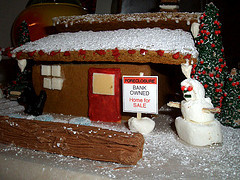Report: Banks Treat Foreclosed Homes Better In Mostly White Neighborhoods
While Americans of every possible ethnic and racial group were hit by the massive foreclosures when the economy went KABOOM! a few years back, a new report claims that banks are often giving short shrift to the upkeep and marketing of foreclosed properties in areas with predominantly non-white residents.
Earlier today, the National Fair Housing Alliance released the results of its undercover investigation into how bank-owned properties are treated in nine major metro areas — Atlanta, Baltimore, Dallas, Dayton, Miami/Fort Lauderdale, Oakland, Philadelphia, Phoenix, and Washington, DC.
Foreclosed properties in each of these areas were graded on a 100-point scale. Undercover researchers would subtract points for broken windows and doors, water damage, overgrown lawns, no “for sale” sign, trash on the property, and other deficits.
In all, investigators looked at 39 aspects of the maintenance and marketing of each property.
Some of their findings:
* Foreclosed homes in non-white communities were 42% more likely to have more than 15 maintenance problems.
* Bank-owned properties in non-white communities were 82% more likely to have broken or boarded-up windows than foreclosed homes in predominantly white areas.
* A foreclosed home in a predominantly white neighborhood is 32% more likely to be marketed with the proper signage than bank-owned buildings in mostly African-American neighborhoods and 38% more likely than in Latino neighborhoods.
During the housing boom, some lenders like Countrywide pushed minority mortgage applicants into subprime mortgages even if they would have been approved for a standard loan. The NFHA sees the disparities uncovered by its study to be just an extension of this behavior.
“This report offers evidence that banks responsible for peddling unsustainable loans to communities of color and triggering our current foreclosure crisis are continuing to damage those communities by failing to properly maintain and market the properties they own,” said Shanna L. Smith, President and CEO of the National Fair Housing Alliance. “We hope that banks will heed the information in this report and take immediate action to correct the disparate treatment we have found… The proper maintenance and marketing of REO properties is a key factor in the sale of homes to families rather than to investors.”
Smith says the NFHA will be filing administrative complaints with Dept. of Housing and Urban Development, and is considering the possibility of federal lawsuits for violations of the Fair Housing Act.
Want more consumer news? Visit our parent organization, Consumer Reports, for the latest on scams, recalls, and other consumer issues.


